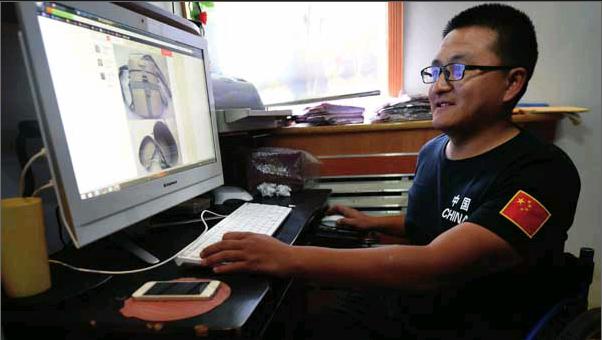Willing and Able
By+Xia+Yuanyuan

THERE was a time when Gao Mengwen felt her life was a cruel twist of fate. The 26-year-old native of Hangzhou, in east Chinas Zhejiang Province, has suffered from cerebral palsy since birth and can only move with the support of a wheelchair. One of her biggest fears for several years was how she could earn a living and not be a financial burden on others. It was technology that threw Gao a lifeline and today the newly motivated young woman, armed with a laptop and WiFi, has taken advantage of the giant e-commerce platform Taobao to carve out a thriving business for herself.
And like Gao, e-commerce is creating more job opportunities for the people with disabilities in China.
Dream to reality
Though Gao always realized she was different growing up, she never lost hope and studied hard at school. It was not until 2014, when she began job hunting, that the reality struck home.
“I couldnt find a job when I graduated from college,”she said remembering the arduous routine of sending out hundreds of her résumés to companies without any reply. “I realized my physical condition is an obstacle, and have to admit sometimes people with disabilities are being looked at differently in the job market,” she said.
Impressed by the popularity of e-commerce, the idea to open a store on Taobao was hatched, and she decided to be her own boss. “I like the Internet because it is open, convenient, and equal for all,” she said.
Gao became an online store owner in 2014, focusing mainly on snack foods and enjoying the convenience of working from the comfort of her home. Her disability also does not restrict her from interacting with clients. “I can respond to customers queries through Wangwang [an online chat software between sellers and buyers in Taobao to manage orders].” Her products are collected from her door daily for onward delivery countrywide.
To date, Gao has made more than 2,000 transactions online and her store has a “3-diamond” rating - given to trustworthy stores by Taobao. With an annual income now reaching 50,000 yuan ($7,700), she is understandably proud of her independence.
Like Gao, an increasing number of people with physical disabilities in China are setting up e-commerce businesses, typically on Taobao. According to the Zhejiang Province Disabled Persons Federation, the total number of people with disabilities in the province who started businesses online had exceeded 10,000 by July 2016, among which more than 6,000 are on Taobao.
Growing opportunities
The growing interest of people living with disabilities moving toward employment online is borne out by a report, dating back to December 2015, by Alibabas (Chinas version of E-bay) Ali Research Institute. Released at the China Disabled Persons Federation (CDPF) in Beijing, the report analyzed aspects of store owners and customers on Taobao, one of Alibabas major online marketplaces. It showed that the Internet has created a growing number of job opportunities for people living with disabilities in China.
As of June 2015, a total of 316,000 people living with disabilities had opened online stores on Taobao. The report also showed that 80 percent of the owners earned nearly 30,000 yuan ($4,600) a year from their online stores.
Jin Jianhang, President of Alibaba, said the group is dedicated to cooperate with the CDPF and other organizations to establish an online barrier-free environment that allows people living with disabilities to enjoy equal rights with others on the Internet.
With this in mind, there are several forms of ecommerce entrepreneurial models for people living with disabilities. Like Gao, a lot of people living with disabilities opened their own stores based on the e-commerce platforms. They sell and deliver products from home with no need to go out.
Another model offered by Taobao is its job facilitation program for people living with disabilities, launched in 2011, offering call-center jobs that allow handling customer calls at home. For example, in July 2016, Dazhou City, located in southwest Chinas Sichuan Province, supported by the Dazhou Disabled Persons Federation, carried out a “Cloud Customer Service” training program to help people with disabilities become Taobao customer service staff, who would offer online consultations at home. The program aims to train 1,000 people with disabilities in the next two years.
Furthermore, rural Taobao service center in Shandong Province is another business model showing much promise. In 2014, Xie Dikang opened a service center in Daling Village in suburban Jinan City. The 38-year-old man was born to an ordinary farmer family in the village, and paralyzed in childhood. After doing odd jobs selling newspapers and other goods in Jinan, Xie, who walks on crutches, decided to start an e-commerce business. Together with a group of friends, he built up his center to help local people buy products from the e-commerce platform, and help people receive their goods. His highest monthly turnover for the service was over 30,000 yuan($4,600).
Social support
Official statistics show that China currently has 85 million people living with disabilities. The country is striving for a xiaokang society, or a moderately well-off society, by 2020, and in this plan people with disabilities are regarded as key “participants, constructors and beneficiaries” of such a society. Job creation is among the key efforts of the government to help people living with disabilities lead a better life, and the Internet-based e-commerce opportunities are helping boost their employment rates.
On December 10, 2015, the CDPF and Alibaba cooperatively launched the Achieving Future program to promote employment for people living with disabilities in China. It set goals to devote 300 million yuan ($46 million) over the next five years toward people living with disabilitiestraining along with the creation of 50,000 Internet-related job opportunities.
“The Internet is a gateway for many people living with disabilities to engage in society,” said Zhang Haidi, Chairwoman of the CDPF, adding that the e-commerce platform is a seed that encourages people living with disabilities to work.

